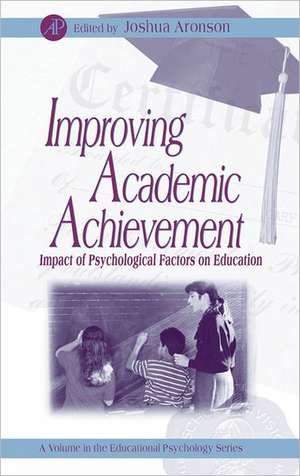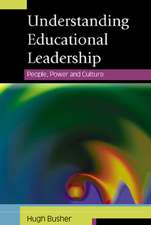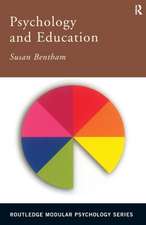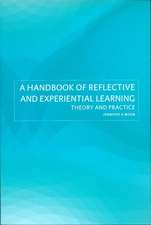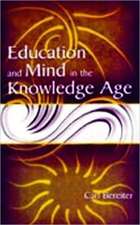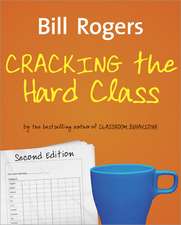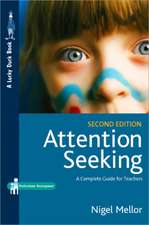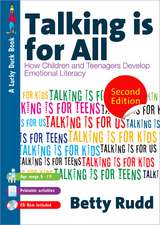Improving Academic Achievement – Impact of Psychological Factors on Education: Educational Psychology
Autor Joshua Aronsonen Limba Engleză Hardback – 14 apr 2002
Section one focuses on what motivates students, how self-esteem affects the learning process, the consequences of achievement goals, the effects of student attributions of success and failure, self-handicapping, methods of strategic learning, and how to successfully use one's intelligence. Section two discusses how the offering of rewards may affect achievement, how teacher expectations may affect student performance, the effects of stereotypes, feedback, and social rejection. There's also a discussion of effective means of turning at-risk students into scholars, and how students can successfully traverse transitions to middle school.
Din seria Educational Psychology
- 23%
 Preț: 442.14 lei
Preț: 442.14 lei - 27%
 Preț: 752.89 lei
Preț: 752.89 lei - 23%
 Preț: 444.07 lei
Preț: 444.07 lei - 9%
 Preț: 1186.14 lei
Preț: 1186.14 lei -
 Preț: 370.17 lei
Preț: 370.17 lei - 27%
 Preț: 1268.61 lei
Preț: 1268.61 lei - 27%
 Preț: 938.26 lei
Preț: 938.26 lei - 27%
 Preț: 943.76 lei
Preț: 943.76 lei - 9%
 Preț: 850.86 lei
Preț: 850.86 lei - 9%
 Preț: 738.24 lei
Preț: 738.24 lei - 27%
 Preț: 947.97 lei
Preț: 947.97 lei - 23%
 Preț: 440.33 lei
Preț: 440.33 lei -
 Preț: 443.35 lei
Preț: 443.35 lei - 23%
 Preț: 452.05 lei
Preț: 452.05 lei - 27%
 Preț: 1074.02 lei
Preț: 1074.02 lei - 23%
 Preț: 677.01 lei
Preț: 677.01 lei - 23%
 Preț: 582.35 lei
Preț: 582.35 lei - 18%
 Preț: 473.88 lei
Preț: 473.88 lei - 23%
 Preț: 482.79 lei
Preț: 482.79 lei - 24%
 Preț: 502.45 lei
Preț: 502.45 lei - 8%
 Preț: 371.90 lei
Preț: 371.90 lei - 23%
 Preț: 700.15 lei
Preț: 700.15 lei - 9%
 Preț: 485.13 lei
Preț: 485.13 lei - 23%
 Preț: 644.00 lei
Preț: 644.00 lei - 27%
 Preț: 753.45 lei
Preț: 753.45 lei - 22%
 Preț: 422.27 lei
Preț: 422.27 lei -
 Preț: 410.41 lei
Preț: 410.41 lei -
 Preț: 392.30 lei
Preț: 392.30 lei -
 Preț: 409.80 lei
Preț: 409.80 lei -
 Preț: 386.54 lei
Preț: 386.54 lei - 23%
 Preț: 677.86 lei
Preț: 677.86 lei -
 Preț: 502.12 lei
Preț: 502.12 lei -
 Preț: 256.06 lei
Preț: 256.06 lei
Preț: 804.21 lei
Preț vechi: 1044.42 lei
-23% Nou
Puncte Express: 1206
Preț estimativ în valută:
153.89€ • 160.100$ • 127.83£
153.89€ • 160.100$ • 127.83£
Carte tipărită la comandă
Livrare economică 02-16 aprilie
Preluare comenzi: 021 569.72.76
Specificații
ISBN-13: 9780120644551
ISBN-10: 012064455X
Pagini: 396
Dimensiuni: 152 x 229 x 26 mm
Greutate: 0.7 kg
Ediția:New.
Editura: Emerald Publishing
Seria Educational Psychology
ISBN-10: 012064455X
Pagini: 396
Dimensiuni: 152 x 229 x 26 mm
Greutate: 0.7 kg
Ediția:New.
Editura: Emerald Publishing
Seria Educational Psychology
Public țintă
Educational and cognitive psychologists as well as school administrators, teachers, policy makers, and parents.Cuprins
Contributors.
A.J. Elliott, Foreword.
Preface.
Acknowledgements.
Part One: Introductory Chapter:
F. Pajares and D.H. Schunk, Self and Self-Belief in Psychology and Education: A Historical Perspective.
Part Two: Revisiting and Extending Classic Lessons:
R. Rosenthal, The Pygmalion Effect and its Mediating Mechanisms.
C.S. Dweck, Messages That Motivate: How Praise Molds Students' Beliefs, Motivation, and Perfrmance (In Surprising Ways).
E.L. Deci and R.M. Ryan, The Paradox of Achievement: The Harder you Push, the Worse it Gets.
T.D. Wilson, M. Damiani, and N. Shelton, Improving the Academic Performance of College Students with Brief Attributional Interventions.
F. Rhodewalt and M.W. Tragakis, Self-Handicapping and School: On Academic Self-Concept and Self-Protective Behavior.
M.R. Lepper and M. Woolverton, The Wisdom of Practice: Lessons Learned from the Study of Highly Effective Tutors.
A. Wigfield and J.S. Eccles, Students' Motivation During the Middle School years.
P.J. Gaskill and A.W. Hoy, Self-Efficacy and Self-Regulated Learning: The Dynamic Duo in School Performance.
E. Aronson, Building Empathy, Compassion and Achievement in the Jigsaw Classroom.
R.J. Sternberg, Intelligence is not Just Inside the Head: The Theory of Successful Intelligence.
Part Three: Current Lessons:
D.A. Pizarro and P. Salovey, Being and Becoming a Good Person: The Role of Emotional Intelligence in Moral Development and Behavior.
F.H. Rauscher, Mozart and the Mind: Factual and Fictional Effects of Musical Enrichment.
J. Aronson, Stereotype Threat: Contending and Coping with Unnerving Expectations.
G.L. Cohen and C.M. Steele, A Barrier of Mistrust: How Negative Stereotypes Affect Cross-Race Mentoring.
A.R. Pratkanis, M.E. Turner, and S.B. Malos, Towards a Resolution of an American Tension: Some Applications of the Helping Model of Affirmative Action in Schooling.
A.W. Harrist and K.D. Bradley, Social Exclusion in the Classroom: Teachers and Students as Agents of Change.
Index.
A.J. Elliott, Foreword.
Preface.
Acknowledgements.
Part One: Introductory Chapter:
F. Pajares and D.H. Schunk, Self and Self-Belief in Psychology and Education: A Historical Perspective.
Part Two: Revisiting and Extending Classic Lessons:
R. Rosenthal, The Pygmalion Effect and its Mediating Mechanisms.
C.S. Dweck, Messages That Motivate: How Praise Molds Students' Beliefs, Motivation, and Perfrmance (In Surprising Ways).
E.L. Deci and R.M. Ryan, The Paradox of Achievement: The Harder you Push, the Worse it Gets.
T.D. Wilson, M. Damiani, and N. Shelton, Improving the Academic Performance of College Students with Brief Attributional Interventions.
F. Rhodewalt and M.W. Tragakis, Self-Handicapping and School: On Academic Self-Concept and Self-Protective Behavior.
M.R. Lepper and M. Woolverton, The Wisdom of Practice: Lessons Learned from the Study of Highly Effective Tutors.
A. Wigfield and J.S. Eccles, Students' Motivation During the Middle School years.
P.J. Gaskill and A.W. Hoy, Self-Efficacy and Self-Regulated Learning: The Dynamic Duo in School Performance.
E. Aronson, Building Empathy, Compassion and Achievement in the Jigsaw Classroom.
R.J. Sternberg, Intelligence is not Just Inside the Head: The Theory of Successful Intelligence.
Part Three: Current Lessons:
D.A. Pizarro and P. Salovey, Being and Becoming a Good Person: The Role of Emotional Intelligence in Moral Development and Behavior.
F.H. Rauscher, Mozart and the Mind: Factual and Fictional Effects of Musical Enrichment.
J. Aronson, Stereotype Threat: Contending and Coping with Unnerving Expectations.
G.L. Cohen and C.M. Steele, A Barrier of Mistrust: How Negative Stereotypes Affect Cross-Race Mentoring.
A.R. Pratkanis, M.E. Turner, and S.B. Malos, Towards a Resolution of an American Tension: Some Applications of the Helping Model of Affirmative Action in Schooling.
A.W. Harrist and K.D. Bradley, Social Exclusion in the Classroom: Teachers and Students as Agents of Change.
Index.
Recenzii
"A book for anyone who cares about the social-developmental milieu of education and how to improve it. Bringing together 3 generations of influential thinkers from social, cognitive, developmental, personality, and educational psychology, this volume offers a wide-ranging assessment of how the insights and methods of these fields can be used to boost academic achievement. It will educate the next generation of students, inspire innovative research, and become a standard reference in educational psychology."
--Matthew S. McGlone; Professor of Psychology, Lafayette College
"How can teachers improve student achievement? Over the past four decades,
psychologists have developed an enormous body of research to shed light on this crucial question. Too often, though, their answers have remained veiled from teachers in the field. This superb volume of essays promises to bridge the unconscionable gap between psychologists and educators. Spanning an impressive range of issues--including motivation, self-esteem, and racial stereotyping--the volume also unites "classic" studies from the 1960s and 1970s with recent advances. Written in accessible, jargon-free prose, these essays should be required reading for anybody who wishes to study or to instruct children. Psychology has much to teach us, if we will only pause to listen--and to learn."
--Jonathan Zimmerman; Director, History of Education Program, Steinhardt School of Education, New York University
"As educators working in schools, we need to understand what research in education and psychology is discovering about the impact we teachers have on student achievement. We want our practice to be grounded in strategies that are based on insighful, rigorous research. This compilation of meaningful articles provides an opportunity for researchers and educators to learn from each other how to shape classrooms that are supportive, motivating and empowering for our students. Teachers are increasingly working with students who have a wide range of learning styles and abilities. National standardized testing shows there is a growing gap between the academic achievement of students depending on race and class. If we are serious about reducing this gap and promoting the academic achievement of every student, this research will help guide us as we transform classrooms into learning environments that can truly educate every student."
--Sarah Feldman; Assistant Principal
Stanley Middle School, Lafayette, California
--Matthew S. McGlone; Professor of Psychology, Lafayette College
"How can teachers improve student achievement? Over the past four decades,
psychologists have developed an enormous body of research to shed light on this crucial question. Too often, though, their answers have remained veiled from teachers in the field. This superb volume of essays promises to bridge the unconscionable gap between psychologists and educators. Spanning an impressive range of issues--including motivation, self-esteem, and racial stereotyping--the volume also unites "classic" studies from the 1960s and 1970s with recent advances. Written in accessible, jargon-free prose, these essays should be required reading for anybody who wishes to study or to instruct children. Psychology has much to teach us, if we will only pause to listen--and to learn."
--Jonathan Zimmerman; Director, History of Education Program, Steinhardt School of Education, New York University
"As educators working in schools, we need to understand what research in education and psychology is discovering about the impact we teachers have on student achievement. We want our practice to be grounded in strategies that are based on insighful, rigorous research. This compilation of meaningful articles provides an opportunity for researchers and educators to learn from each other how to shape classrooms that are supportive, motivating and empowering for our students. Teachers are increasingly working with students who have a wide range of learning styles and abilities. National standardized testing shows there is a growing gap between the academic achievement of students depending on race and class. If we are serious about reducing this gap and promoting the academic achievement of every student, this research will help guide us as we transform classrooms into learning environments that can truly educate every student."
--Sarah Feldman; Assistant Principal
Stanley Middle School, Lafayette, California
